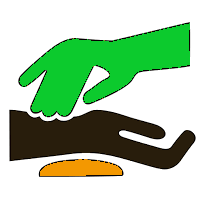

Die Fünf-Elemente-Lehre (chinesisch 五行學 / 五行学 – „Lehre der Fünf Wandlungsphasen“, kurz 五行) ist eine daoistische Theorie zur Naturbeschreibung. Die Fünf-Elemente-Lehre untersucht die Gesetzmäßigkeiten, nach denen dynamische Umwandlungsprozesse (Wandlungen) im Bereich des Lebendigen ablaufen, betont also Werden, Wandlung und Vergehen. Die fünf Elemente Holz, Feuer, Metall, Wasser und Erde sind unmittelbar aus der Natur abgeleitet. Aus ihren (abstrahierten) Eigenschaften wird auf die Beziehungen zwischen Erde, Mensch und Himmel und innerhalb dieser Sphären geschlossen.
Die lange Tradition der Fünf-Elemente-Lehre wirkt in die chinesische Philosophie und ist von Bedeutung im Shiatsu, Tuina, Feng Shui, Taijiquan, Xingyiquan, Qigong. Weitere Wirkungen hat sie in der traditionellen Chinesischen Medizin (TCM), der Akupunktur und ganzheitlichen Ansätzen der neueren westlichen Medizin.
Der Buddhismus kennt die Elemente Erde, Wasser, Luft, Feuer und Leere als Fünf Elemente. Diese Lehre unterscheidet sich von der daoistischen. Die antike griechische Philosophie entwickelte die Vier-Elemente-Lehre mit den Elementen Luft, Feuer, Wasser und Erde und teilweise dem Äther als Quintessenz und fünftem Element.
| Holz | 木 mù | Aufbruch, Entwicklung eines Handlungsimpulses, Expansion, Steigen |
| Feuer | 火 huǒ | Ausgestaltung, dynamische Phase, Aktion |
| Erde | 土 tǔ | wandelnd, umwandelnd, verändernd, Fruchtbildung |
| Metall | 金 jīn | Reife, Kontraktion, Kondensation, Ablösung, Sinken |
| Wasser | 水 shuǐ | Betrachtung, Lageerfassung, Ruhe |
五行是战国政治学的一种哲学系统,战国儒家把宇宙万物根据其特征划分成火、水、木、金、土五大类(七政的次序),统称“五行”。五行并非指具体的五种单一的事物,而是对宇宙间万事万物的五种不同属性的抽象概括。
如果说阴阳是古代的对立统一学说,那么五行可以说是一种源自政治的哲学思想。《尚书》学派认为,大自然的现象由“火、水、木、金、土”这五种气的变化所总括,不但影响到人的命运,同时也使宇宙万物循环不已;它强调整体概念,描绘了事物的结构关系和运动形式。
五行和阳阴学说一样,作为汉文化的重要成分,涉及到伪中医学、堪舆、命理、相术和占卜等方面。
五行思想(ごぎょうしそう)または五行説(ごぎょうせつ)とは、古代中国に端を発する自然哲学の思想。万物は木・火・土・金・水の5種類の元素からなるという説である。
また、5種類の元素は「互いに影響を与え合い、その生滅盛衰によって天地万物が変化し、循環する」という考えが根底に存在する。
西洋の四大元素説(四元素説)と比較される思想である。
Wuxing (Chinese: 五行; pinyin: wǔxíng), usually translated as Five Phases, is a fivefold conceptual scheme that many traditional Chinese fields used to explain a wide array of phenomena, from cosmic cycles to the interaction between internal organs, and from the succession of political regimes to the properties of medicinal drugs. The "Five Phases" are Fire (火 huǒ), Water (水 shuǐ), Wood (木 mù), Metal or Gold (金 jīn), and Earth or Soil (土 tǔ). This order of presentation is known as the "Days of the Week" sequence. In the order of "mutual generation" (相生 xiāngshēng), they are Wood, Fire, Earth, Metal, and Water. In the order of "mutual overcoming" (相剋/相克 xiāngkè), they are Wood, Earth, Water, Fire, and Metal.[1][2][3]
The system of five phases was used for describing interactions and relationships between phenomena. After it came to maturity in the second or first century BCE during the Han dynasty, this device was employed in many fields of early Chinese thought, including seemingly disparate fields such as Yi jing divination, alchemy, feng shui, astrology, traditional Chinese medicine, music, military strategy, and martial arts.
Les wuxing (chinois simplifié : 五行 ; pinyin : ) ou Cinq Phases1 — bois, feu, terre, métal et eau — constituent un concept important de la cosmologie chinoise traditionnelle.
Ces notions apparues sous les Royaumes combattants (Ve-IIIe siècle av. J.-C.), ont servi à construire un vaste système de classification et de correspondances qui, une fois unifié avec le système Yinyang et la notion de Qi, a eu un impact considérable sur toute l'histoire de la pensée chinoise2,3,4,5,6.
Le terme xíng (行, marche), habituellement traduit par « élément », évoque plutôt un mode d’action qu’une matière ; il est d’ailleurs remplacé par le terme dé (德, vertu ou effet) chez Zou Yan. Néanmoins dans le Zuo Zhuan, le terme cai (材, matériau) apparaît. Les éléments semblent donc pouvoir recevoir des interprétations différentes.
I Wu Xing (五行?) (denominati anche i cinque elementi) sono un concetto tipico della cultura cinese che viene utilizzato in svariati campi, dalla medicina tradizionale cinese alle arti marziali.
Risalente presumibilmente al periodo delle primavere e degli autunni (春秋時代T, Chūnqiū ShídàiP), che copre un arco della storia cinese dal 722 a.C. al 481 a.C., la dottrina dei cinque elementi fu esposta per la prima volta dal filosofo cinese Chou Yen (ca. 350-270 a.C.).[2] Essa consiste in una visione sistematica dell'antica filosofia taoista cinese, ampiamente utilizzata nella medicina tradizionale cinese, nella feng shui, nella numerologia, nella filosofia e nella divinazione.[3]
La teoría de los Cinco Elementos (Chino: 五行; Pinyin: wǔxíng) es una forma de clasificar los fenómenos naturales, y sus interrelaciones, según la filosofía china tradicional. Una traducción más exacta sería cinco fases o cinco movimientos, para no perder el carácter dinámico y de transformación que tiene en chino. Esta teoría se aplica a campos tan dispares como la música, la medicina china tradicional, la estrategia militar, las artes marciales o el Feng Shui.12345 Los cinco elementos son: madera (木, mù), fuego (火, huǒ), tierra (土, tǔ), metal (金, jīn) y agua (水, shǔi). La teoría describe los ciclos de generación (生, shēng) y de dominación (克, kè) entre ellos.
У-син (пять элементов; пять стихий; пять действий; пять движений; пять столбцов; пять фаз; пять состояний кит. 五行, пиньинь wŭ xíng) — одна из основных категорий китайской философии; пятичленная структура, определяющая основные параметры мироздания. Это огонь (火), вода (水), дерево (木), металл (金) и земля (土). Помимо философии, широко используется в традиционной китайской медицине, гадательной практике, боевых искусствах, нумерологии, в искусстве фэн-шуй.






